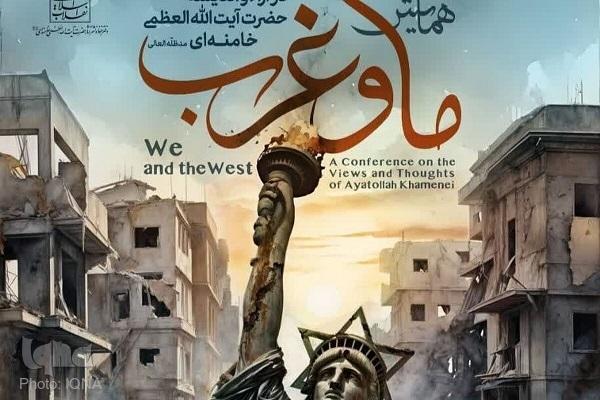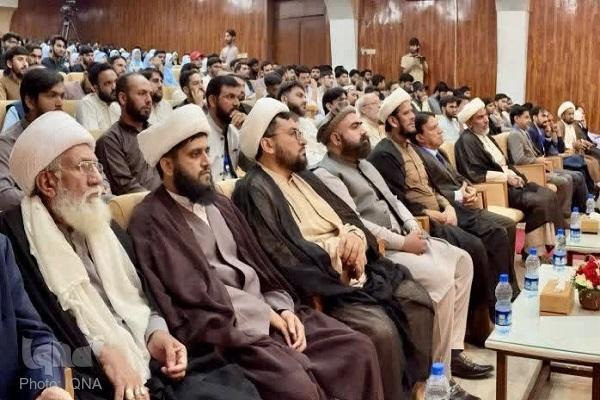Islamic Resistance; A Strategy for Rebuilding Civilizational Identity against Western Domination

They attended the pre-session of the international conference “We and the West in the Thoughts and Ideas of the Leader of the Islamic Revolution" on Tuesday night.
It focused on the political and civilizational theories of Ayatollah Seyed Ali Khamenei. The event, titled “Islamic Civilization and Western Colonialism”, brought together Pakistani intellectuals, academics, and former diplomats.
It was organized to analyze a framework of “civilizational resistance” to Western dominance, rooted in the Leader’s ideology.
Kazem Saleem, the deputy of research for the Al-Mustafa International University representative office in Pakistan, opened the event. He explained the conference’s objectives, stating, “The pre-session of the international conference is, in fact, an examination of the dimensions of Islamic resistance, which is a valuable endeavor in the present age.”
He emphasized the importance of the gathering, adding, “Today, re-reading the civilizational and anti-colonial ideas of the Leader of the Islamic Revolution is an important and necessary action. This is a significant step in rebuilding the intellectual and civilizational identity of the Islamic Ummah.”
Next, Professor Qandeel Abbas, Head of the International Relations Department at Quaid-e-Azam University, Islamabad, presented a paper titled “Theoretical Foundations of Resistance to Colonialism in the Light of Islamic Civilization.”
Using a sociological approach, he considered colonialism not merely a political phenomenon but a civilizational structure that dominates the minds, languages, and cultures of nations.
The university professor stated that resistance is the response of a living civilization to the aggression of another civilization; and this is the truth that the Islamic Revolution of Iran revealed in the field.
Emphasizing the historical experience of the Iranian nation, he added: Religious self-confidence and cultural independence are the most effective shields against modern colonialism.
Then, Professor Muhammad Khan, former Dean of the Faculty of International Relations of the National Defense University of Pakistan, presented a paper titled “Islamic Civilization and the Discourse of Resistance with Emphasis on the Western Islamophobic Project.”
Emphasizing the necessity of reviving the idea of resistance in the educational and research systems of the Islamic world, he stated, “The leaders of the Islamic Revolution breathed new life into the body of the Ummah by redefining resistance as a cognitive, cultural and ethical system.”
The university professor added that the connection of justice, science and resistance is the foundation of the reconstruction of Islamic civilization in the new era.
Read More: Islamic Resistance Tree Stands Strong, Resilient: Iran Judiciary Chief
Shamshad Ahmad Khan, a senior diplomat and former secretary general of the Ministry of Foreign Affairs of Pakistan, while explaining his experiences in the field of international diplomacy, emphasized that Muslim nations will overcome foreign domination when they achieve civilizational self-awareness and intellectual independence.
He added that Iran and the resistance movement, by reviving Islamic self-confidence, showed that colonial domination is not an inevitable fate, but rather a faithful will can break it.
“The thought of resistance must become an epistemological model throughout the Islamic world so that the Islamic Ummah can move from a position of weakness to a position of strength.”

Then, Raziq Hossein, a professor of international relations at the Muslim Youth University, Islamabad, analyzed the epistemological structure of resistance in his paper titled “The Doctrine of Resistance; Jurisprudential and Sociological Foundations”.
He said resistance is a comprehensive system inspired by monotheism and Wilayat (guardianship), which has been explained theoretically and practically in the thought of Imam Khomeini (RA) and the Leader of the Islamic Revolution.
He emphasized that this system considers invincibility against colonialism not a slogan, but faith in the divine promise.
Mohammad Asim, a researcher in the field of international relations, was another speaker. He referred to the necessity of resistance in various fields, especially in the field of economics, saying resistance economy in the thought of Imam Khomeini (RA) and the Leader of the Revolution is the objective manifestation of civilizational resistance against the system of domination.
He added that the principle of “we can” is the basis of economic independence and a symbol of the civilizational will of the Iranian nation.
At the end of the ceremony, Ayatollah Seyed Sajid Ali Naqvi, a great scholar of the Ahl-ul-Bayt school (AS) and the representative of the Leader in Pakistan, considered this scientific and research movement a valuable and necessary action.
Appreciating the representative office of the Al-Mustafa Mustafa International University for holding the event, he emphasized the continuation and expansion of such meetings in universities and elite gatherings, and said explaining the civilizational and anti-colonial thoughts of the Leader of the Islamic Revolution is an intellectual necessity for the awakening of the Islamic Ummah, and such activities can free the young generation from the intellectual captivity of the West.
4312109



